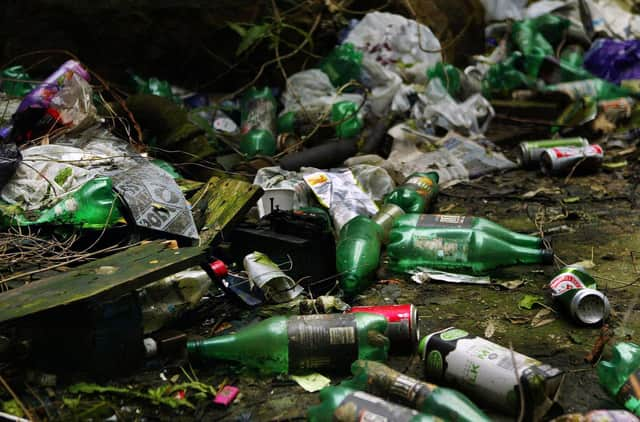Fly-tipping in Scotland: How we can end this scourge of our beautiful nation – Murdo Fraser MSP


It depicts a grumpy-looking cartoon Scotsman, with the slogan: “If we’re all so proud to be Scottish, who’s dropping all the litter?”
It’s an effective message because it strikes a chord. Scotland’s natural environment is something we should all be proud of, more so in this year in the lead-up to the UN Cop26 climate summit than ever previously.
Advertisement
Hide AdAdvertisement
Hide AdAnd yet, the problems of littering and fly-tipping are actually on the increase. There is a clear mismatch between the regard we claim to have for our country, and the way we treat it in practice.
There is little doubt there has been an explosion in incidents of fly-tipping, in particular, over the past year. This trend started to appear last spring, when council recycling centres were closed due to Covid restrictions.
Since their reopening, the problem has not gone away, with farmers, landowners, countryside groups, and local councils reporting serious issues with the dumping of rubbish in the countryside.
It would be wrong to characterise this just as a rural problem, although in practice the dumping of rubbish undetected in less populated areas carries fewer risks for the perpetrators than busier localities.
Within our towns and cities, industrial estates and wasteland have become repositories for fly-tipped rubbish. There is increasing evidence that, far from just being the actions of random individuals, organised crime is now involved in a systematic way in charging for the collection of refuse from businesses and individuals, and then disposing of it illegally.
There is work being done to try and tackle this serious, and growing, problem. Zero Waste Scotland, in partnership with the Scottish government and the charity Keep Scotland Beautiful, has launched the “Scotland is stunning – let’s keep it that way” litter prevention campaign. They are also working on a fly-tipping strategy, which it is hoped will be finalised by the end of this year.
Whilst focusing on public education is an important part of the answer, there are other practical measures that need to take effect.
Whilst councils have now reopened recycling centres, many have imposed restrictions on their use, including limited opening hours and queuing systems. Difficulty in accessing waste recycling can never be an excuse, but human nature being what it is, such restrictions are a contributory factor when it comes to the rise in fly-tipping incidents.
Advertisement
Hide AdAdvertisement
Hide AdIt is also my view that the current laws in this area need to be updated, on the basis that they are simply inadequate to deal with the scale of the problem that we now have.
Our current legal framework dates back to the Environmental Protection Act of 1990, making it a criminal offence for any person “knowingly to cause or knowingly to permit controlled waste to be deposited, in or on any land”, unless there is a waste management licence in force. There is also provision for payment of a fixed penalty fine of £200 as an alternative to prosecution.
Over the years, I have been contacted by many frustrated farmers who are the victims of fly-tipping, who find themselves liable for the costs of cleaning up, and potentially facing criminal prosecution, due to the anti-social actions of others for which they are not responsible.
Holding an innocent landowner responsible for the clean-up costs caused by a third party is not only contrary to natural justice, but also falls foul of the principle that should underpin all environmental legislation, namely that the polluter pays. It is time, in my view, that this unfairness was removed from the statute book.
What we should replace it with is a strict liability on the part of the generator of waste, to ensure that it is properly disposed of. It should not be a defence for someone who creates waste to say that they paid a man in a white van £50 to remove it.
All those generating waste should have a legal obligation to dispose of it properly, either themselves, or by means of an authorised waste disposal company, or face action.
We also have to look at the levels of penalties which can currently be imposed. A £200 fixed penalty fine from the local authority is nowhere near the level it needs to be to act as a deterrent against fly-tipping, and nor does it create an incentive for local councils to devote resources to investigating fly-tipping offences.
We should also consider whether decriminalising fly-tipping, and treating it as a civil offence rather than a criminal one, might be a better way forward (as was done in the case of dog fouling some two decades ago).
Advertisement
Hide AdAdvertisement
Hide AdI have heard from those in local authorities of their frustration that the work that they have put in into preparing a criminal case is wasted when the matter goes to the Procurator Fiscal, who then decides that pursuing it is not a priority at a time of stretched resources.
Creating a civil harm, rather than a criminal one, might well achieve a higher level of penalty, and a greater success rate than we currently see, not least because the burden of proof would no longer be “beyond reasonable doubt”.
All these matters, and others, will form the basis of a Member’s Bill that I am considering taking forward in the Scottish Parliament. The first stage in this will be to prepare a public consultation, which I am presently working on following a number of discussions with stakeholders.
Updating the law in this area will only ever be one part of the jigsaw when it comes to tackling this serious and growing problem across our country. But if we are all so proud to be Scottish, and truly care about our environment, then we need to bring the scourge of fly-tipping to an end.
Murdo Fraser is a Scottish Conservative MSP for Mid-Scotland and Fife
